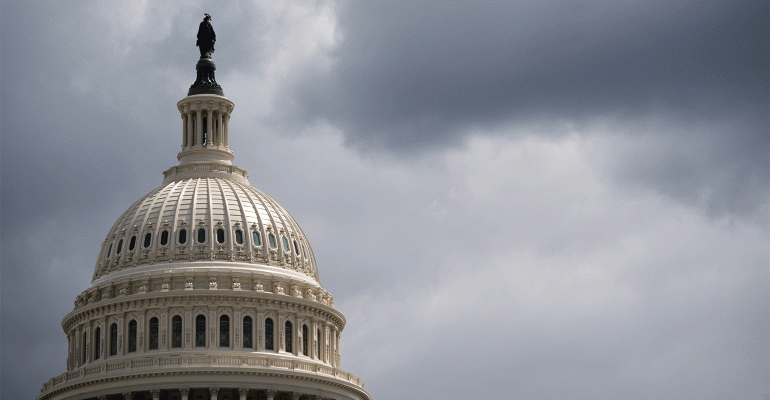Senate Republicans introduced a fourth COVID-19 stimulus package on Monday dubbed the Health, Economic Assistance, Liability and Schools, or HEALS, Act.
The $1 trillion package includes another round of $1,200 stimulus checks for more Americans, as well as a $190 billion third round of Paycheck Protection Program funding. It would also reduce the federal extension of unemployment benefits from $600 to $200 per week.
For employers, the proposal would offer a measure of protection from liability, said Senate Majority Leader Mitch McConnell (R-Ky.)
Like the CARES Act that was adopted in March, the economic stimulus aspect of the HEALS Act would include a round of $1,200 checks for individuals, $2,400 for married couples or those making less than $75,000 as singles, $112,500 for heads of household and $150,000 for joint taxpayers.
The HEALS Act would include some changes to the stimulus checks program, like an expansion of an extra $500 in stimulus for eligible adult dependents, and a provision that would stop stimulus checks from being distributed to deceased people.
Supplemental federal unemployment benefits, however, would be temporarily reduced from $600 to $200. The $600 per week extended benefits approved under the CARES Act is scheduled to end July 31.
“For unemployment insurance, we boost the federal government’s reimbursements to local governments and nonprofits to 75 percent — up from 50 percent in the CARES Act to prevent further layoffs,” Sen. Chuck Grassley (R-Iowa) said on the Senate floor Monday. “We’ll maintain some of the current boosted benefit, while responsibly honing programs to target help where it’s needed. This transition from a flat rate to a replacement of about 70% of lost wages is a better approach.”
The economic assistance portion of the bill, according to Sen. Marco Rubio (R-Fla.), would include a $190 billion second round of Paycheck Protection Program funding for both second-draw and first-time small-business loan applicants.
The Continuing Small Business Recovery and Paycheck Protection Program Act would authorize $100 billion “long-term, low-cost loans to recovery sector businesses” (including seasonal businesses and businesses with 500 employees in low-income census tracts), $190 billion in PPP second-draw loans (for businesses with no more than 300 employees, and at least a 50% reduction in revenues during the pandemic), and $25 billion set aside for businesses with fewer than 10 employees, along with $10 billion in funding for small community lenders.
The HEALS Act would also allow business owners to take a temporary 100% tax deduction on business meals, which would encourage dining out.
However, despite intense lobbying from restaurant advocacy groups, the package offered no specific restaurant industry relief.
“As we expected, the legislation includes another extension to the Paycheck Protection Program for small businesses but no industry-specific grant programs,” the Independent Restaurant Coalition said in a statement. “These new loans are a start to protecting independent restaurants from permanently closing, but more must be done. The good news is this is just the beginning of negotiations.”
Other food industry leaders believe that Sen. Marco Rubio’s proposed changes to the second round of the PPP loans are too stringent for viable businesses to qualify.
“Sen. Rubio’s proposal requiring employers to show a 50% revenue loss to qualify for a second Paycheck Protection Program loan is particularly problematic,” Mark Allen, president and CEO of the International Foodservice Distributors Association, said in a statement. “This puts the focus on businesses on the brink of failure. The legislation should be designed to help struggling, yet viable, employers before they are on the brink of failure. The restaurant industry goes into the red well before reaching that 50% threshold. In support of our partners in the restaurant industry, IFDA believes this threshold should be set at a more reasonable 20%.”
The final aspect of the bill — liability protection — would provide legal protection to health-care providers, schools, and employers against lawsuits that might be brought against them for exposure to coronavirus.
The GOP proposal reportedly faces an uphill battle as some Senate Republicans on Tuesday took issue with some key aspects — including the $1 trillion price tag — as McConnell began negotiations with Democrats.
Democrats put forward a $3 trillion relief package that was passed by the House in May. The Health and Economic Recovery Omnibus Emergency Solutions, or HEROES, Act includes a $1,200 stimulus check and maintaining the $600 per week extended unemployment benefits. It would also enhance the employee retention tax credit to keep workers on the payroll, provide another $10 billion for emergency grants to small business, and it would carve out funds for small business.
For our most up-to-date coverage, visit the coronavirus homepage.
Contact Joanna Fantozzi at [email protected]
Follow her on Twitter: @joannafantozzi





